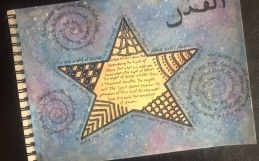 This article is not about how you can connect with the Qur’an in Ramadan. Rather, it is about forming a sweet and personal relationship that lasts a lifetime—but perhaps by using Ramadan as your launchpad.
This article is not about how you can connect with the Qur’an in Ramadan. Rather, it is about forming a sweet and personal relationship that lasts a lifetime—but perhaps by using Ramadan as your launchpad.
The Qur’an is one book sent to all of mankind and, as mankind is diverse, our approach with the Qur’an is also varied. Not everyone has to become accomplished in everything from reading, understanding, drawing rulings from, and teaching it.
However, I do believe that each one of us must make some sort of connection with it in our own unique way.
My personal connection and passion relating to the Qur’an is in reading it and going deep into the science of recitation as it has been transmitted from the time of the Prophet Muhammad (peace and blessings of Allah be upon him). It resonates with me so much that I have willingly spent years studying just this aspect of it, received authorisation to teach it, and I continue to study further while I teach my own students.
Since that is the only aspect of connecting with the Qur’an that I specialise in (for the moment— may Allah open doors to more knowledge), this article focusses only on how you can build up on your ability to read the Qur’an.
My interest in recitation did not come naturally. Despite taking lessons from the time I was 3 or 4 years old, I was a poor reader well into my twenties. That was until I found a fantastic teacher who changed my whole perception and made things easy for me. Thus I know that there is hope for anyone!
The first step is to dispel the idea that it is difficult. Maybe you accepted Islam just recently and Arabic looks like a tangled web of curvy lines and dots, or maybe you are still overcoming bad experiences with harsh teachers who made you hate the subject.
Shut the door on those worrisome thoughts. This is the book that YOUR Maker, the Most Loving, revealed for your benefit. Do not let anyone or anything hijack that gift. Open it and see what that Most Loving Lord is saying to you.
Secondly, initiate private contact. What I mean is that your reading of the Qur’an does not have to be a public affair that is open to comments and criticism from those around you who may intentionally or unintentionally say and do things to weaken your resolve.
Instead, make your reading a private matter. Nobody has to know how much you read for a day, or what you read, or when you read. This not only serves to maintain your resolve but also saves you from becoming victim to showing off (riya), seeking praise, or ruining your pure intentions.
Thirdly, remember that every letter that you read is rewarded; even if you’re just stuttering and repeating the same 3-4 letters for 15 minutes. The cool thing about reading the Qur’an is that you do not have to get to the finish line to make it worthwhile. Every. Letter. Counts.
And what’s more? If you’re stuttering, you get twice the reward.
لَ َ ع َ و ُ ه َ و ِ يه ِ ف ُ َع ت ْ ع َ ت َ ت َ ي َ َن و آ ْ ُر أُ الْق َ ْر ق َ ي ي ذِ َّ ال َ ةِ و َ ر ََ الَْب امِ َ ر الْكِ ةِ َ َر َّسف ال َ ع َ م آنِ ْ ُر ِِبلْق ُ ر ِ اه َ الْم انِ َ ر ْ أَج ُ ق لَه َشا ٌّ ِ ه ْ ي
“One who is proficient in the Qur’an is associated with the noble, upright, recording angels; and he who falters in it, and finds it difficult for him, will have a double reward.” [Sahih Muslim]
If you already know a thing or two about reading Arabic but want to improve on fluency, use a tool like www.ReciteQuran.com or even www.Quran.com which allows you to click on each word and hear the pronunciation for it, and then join the words together. Adjust the settings to choose a reciter that you like, along with the choice of translation (word-by-word/verse-by-verse). Go to Suratul Fatihah and try reading.
Once you’re comfortable with it (whether it takes weeks or months), move to Suratul Ikhlas, then Al-Falaq and An-Naas. As you keep doing this, you will fall in love with Qur’an time and your days will start feeling empty unless you do a bit of your own recitation.
If you happen to be a fluent reader but your weakness is in making time for reading, I would suggest keeping a pocket-sized Qur’an within reach. Smartphone Qur’an apps are good, but I would leave those for times when I need to look something up in the Qur’an. For actual reading, it is far better to use a physical copy because:
a. You can leave it within view as a reminder. I work a lot at a desk, so I like having my mushaf next to my laptop. If you travel a lot during the day, you could have it on the dashboard of your car, or in an easy-to-access compartment of your handbag.
In other words, make your mushaf as easy to access as your phone. Replace the habit of reaching for your phone with reaching for your mushaf. You could take it to a higher level by placing your mushaf on top of your phone and challenging yourself to read an ayah or two before you allow yourself to unlock your phone.
b. You can draw hearts and stars around ayat that have a special impact on you and make notes in the margins.
c. There are no distractions. With a smartphone app, on the other hand, you might pick up your phone to recite Qur’an, but get absent-mindedly drawn into checking and responding to notifications and get lost in it until you forget why you picked up the phone in the first place!
d. Write down meanings of words as you read your translation and gradually build up your Quranic Arabic vocabulary as you read those sections over and over and see the meanings each time.
This is just a recommendation, however. Use whatever works better for you.
If you are a fluent reader, I’d recommend having Qur’an buddies who motivate you to keep reading and discovering new gems. Your Qur’an buddies can be people whom you see and meet often or people you’ve never met from the other side of the world but who actively participate in online forums and Qur’an-related groups.
If you are a beginner or at an intermediate level of reading, I would strongly encourage you to find a qualified and trained teacher who has been taught by well-qualified teachers. Your teacher can enhance your relationship with the Qur’an or set you back a hundred steps; so choose carefully.
In addition, why I recommend a teacher is so that you learn the right way from the very beginning, instead of working hard by yourself for a long time, only to realise much later that you are actually making serious mistakes and need to unlearn and start from scratch.
I conclude by re-iterating my opening point: build your own special relationship with the Qur’an (under the guidance of a qualified teacher so that you do not fall into serious error). There was a time when I hardly recited the Qur’an because I was not good at it and I thought it was not even worth starting because I would never be able to finish within a reasonable amount of time.
Do not allow yourself to get discouraged by what you should ideally be doing. Instead, incorporate the Qur’an in your life in some small way, every single day.
It doesn’t matter if it takes you ten years to get from cover to cover. This isn’t a race. This is your Lord’s gift to you. These are the same words that came through the blessed lips of the Beloved (may the peace and blessings of Allah be upon him).
Relish it every day.
As we sit in the last few days of this blessed month, set your intention to connect with the Qur’an in your own special way. Then start doing it.
May Allah guide you and make it easy for you and bless you with endless joyous hours with the Qur’an.
Author Bio
Ust. Fatimah is an online Qur’an coach who holds ijaza in the Hafs an Asem (Shatibiyyah) mode of recitation. She specialises in coaching ladies and children around the world to achieve correct recitation and form basic understanding of what is being recited, while enjoying the whole process. You can find her at her website or via her Instagram account.






SubhanAllah! This is such a beneficial post, I have always come across posts that stressed on reciting or memorizing the Quran. Rarely do you see a post on building a connection wit the Quran. JazakAllahu khair for sharing these practical tips sister.
Beautiful Post, Alhumdulillah!